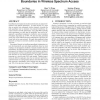Free Online Productivity Tools
i2Speak
i2Symbol
i2OCR
iTex2Img
iWeb2Print
iWeb2Shot
i2Type
iPdf2Split
iPdf2Merge
i2Bopomofo
i2Arabic
i2Style
i2Image
i2PDF
iLatex2Rtf
Sci2ools
137
click to vote
MOBICOM
2010
ACM
2010
ACM
The spaces between us: setting and maintaining boundaries in wireless spectrum access
Guardbands are designed to insulate transmissions on adjacent frequencies from mutual interference. As more devices in a given area are packed into orthogonal wireless channels, choosing the right guardband size to minimize cross-channel interference becomes critical to network performance. Using both WiFi and GNU radio experiments, we show that the traditional "one-size-fits-all" approach to guardband assignment is ineffective, and can produce throughput degradation up to 80%. We find that ideal guardband values vary across different network configurations, and across different links in the same network. We argue that guardband values should be set based on network conditions and adapt to changes over time. We propose Ganache, an intelligent guardband configuration system that dynamically sets and adapts guardbands based on local topology and propagation conditions. Ganache includes three key mechanisms: an empirical model of guardband sizes based on power heterogeneity of ...
| Added | 06 Dec 2010 |
| Updated | 06 Dec 2010 |
| Type | Conference |
| Year | 2010 |
| Where | MOBICOM |
| Authors | Lei Yang, Ben Y. Zhao, Haitao Zheng |
Comments (0)

